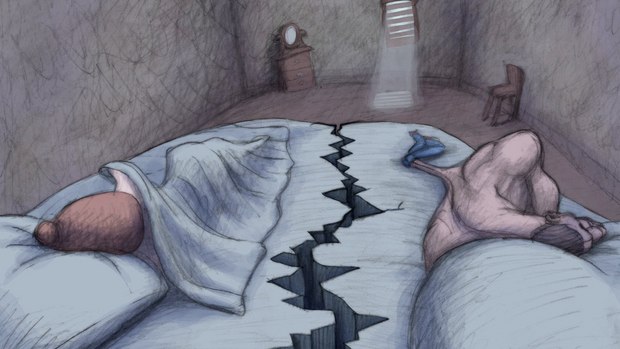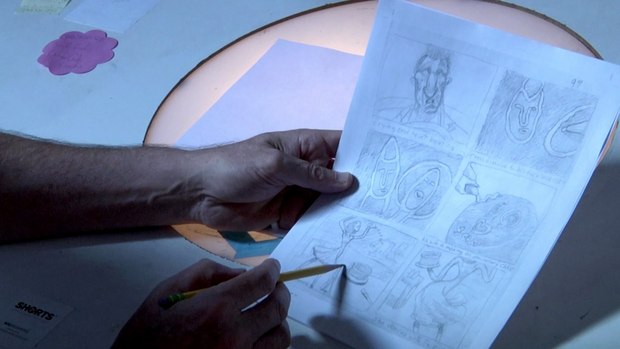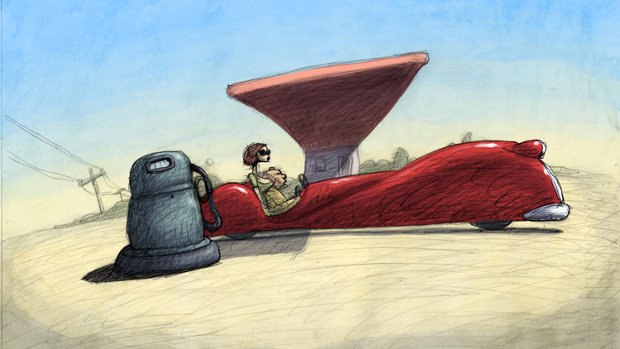The legendary indie animator talks about his brand new film and the Kickstarter campaign that saved the production.
It’s doubtful you’ll find anyone in animation more genuinely humble than Bill Plympton. Nor more prolific. Or driven. From his early days drawing comics for Penthouse, Screw and The New York Times, to his most recent feature film production effort, Bill’s productivity is as legendary as his thematic penchant for sex, violence and ironic humor. He draws constantly, travels the world continually, promotes his work incessantly and always has several shorts, features, comic books and other creative endeavors in various stages of production. The more the community points to him as a shining example of the spirit of independent animation, the more he downplays his accomplishments, his longevity and the tremendous impact he has had on more than one generation of artists.
Both his 2011 marriage to Sandrine Flament and the recent birth of his first child seem to have re-invigorated him physically and creatively. I recently had a chance to sit with Bill, both in Stuttgart and in Annecy, talking about the realities of life as an indie animator, his new film Cheatin’ and the Kickstarter campaign that allowed him to finish its production.
Bill Plympton: Guess what? It’s my birthday in two days.
Dan Sarto: That’s great. Happy Birthday! What’s it like turning 40? [Laughs]
BP: [Laughs] Well I’m feeling good. I got married, I’ve got a new baby and I’m starting life anew. It’s a new beginning.
DS: Congratulations. So tell me about the new film and the Kickstarter fundraising campaign that helped get it finished.
BP: Cheatin’ is a story of two star crossed lovers. It’s a perfect romance. This is Romeo and Juliet times ten. But outsiders are jealous of them. They want to break up their relationship because it’s so beautiful and so perfect. So they plant little seeds of jealousy and suspicion. The couple actually starts to suspect the other is cheating on them. Hence the name Cheatin’. And so eventually they come to blows. They try to kill each other. It becomes very, very violent. A typical comedy from Bill Plympton [laughs].
DS: [Laughs] Just a little conflict.
BP: But it has a wonderful, happy ending. Nobody dies, it’s just for fun. But it’s a darker film. It definitely has some viciousness to it. I’m inspired a lot by James M. Cain, the guy who did Double Indemnity and The Postman Always Rings Twice. I love those Hollywood noir films from the 30’s and 40’s, where these beautiful women are very seductive but yet are killers at the same time. I kind of use those types of characters in this film. So it’s a very Hollywood noir kind of story.
Cheatin’ is a real diversion for me. It’s watercolored animation. I do the original drawings in pencil with a lot of shading and cross hatching, building up on the shadows. Then they are scanned and go to our colorists. We have five or six colorists who put a watercolor technique on top. It’s really luscious. It’s just so delicious to watch these scenes come in when they’re finished.

An original pencil drawing, with shading and cross hatching. Click the image for a high res version.
The problem is it’s very expensive and very time consuming to put on all these layers of watercolor. So I found that I was running out of money quicker than I expected. On a film like Idiots and Angels, the budget was about $150,000. Cheatin’ is approaching $400,000. I just don’t have that kind of money. My pockets aren’t that deep. So we decided to do a Kickstarter campaign. We opened it up I think the 1st of December [2012]. We knew that was the Christmas holiday season and we wouldn’t get a lot of money in December, so we extended it through January because we were hoping that people would be generous after Christmas and take part in it.
We had lots of great gifts for people who wanted to join in. We had lithographs of the art work, which are really beautiful. We had my original pencil drawings, DVDs, copies of my new book. I have a brand new art book out with Rizzoli Publications. If you pledged more you got to have your name in the credits as a producer, have dinner with me, get a portrait of me or a portrait of yourself done by me. So it was pretty cool stuff. We put the goal at $75,000. We thought that was fairly safe. Well, we exceeded $100,000 so we were very successful.
DS: That’s fantastic!
BP: A lot of that was due to Adam Rackoff. He was the guy who managed the campaign. I don’t know how to do Twitter, I don’t know how to do Facebook and all that stuff. He was working it every day, telling people, “Oh you’ve got to tell your friends. This is the coolest film. You’re going to be supporting a great film!”
Another wonderful part of the Kickstarter campaign was connecting with my fans. That was a really important part. Sure they give money and they are very helpful in the production of the film. But, they also spread the word about the film to people who have never heard of Plympton before. And they discover me, they discover my work and now they’re going to support the film when it comes out in movie theatres or when it hits the festival circuit. I also connected up with one guy who wanted to be a financer of the film.
So that was another bonus from the Kickstarter campaign. I got to meet people who had deeper pockets than I did who really wanted to help the production. It’s a wonderful way to avoid the big Hollywood industry system of financing films, where you pitch your ideas and get shot down. After a few pitches you feel like your idea is crap and no one is going to want to support it. This way you go right to the audience. You get positive feedback where everybody feels good and it feels like this is a great, winning film. It’s much different than when you meet with these big executives. They just get so many pitches they really are jaded. They just don’t get excited about many projects, especially a project like mine which has no real normal commercial value.
In Hollywood, it’s computer animation. It’s kiddy films, family films. Cheatin’ is not that. Cheatin’ is the anti-Disney film. It’s 2D, it’s hand drawn, hand colored, a very, very traditional kind of film. Hollywood just doesn’t see an audience for that.
DS: You’ve always taken the independent route, always financed your own work through any and all means. This is a new thing for you, embracing the latest in online social media to put you directly in contact with people that want to see your work and want to support your work. That opens up all sorts of possibilities for you.
BP: Yeah I think it’s a new era for everybody, not just me. I meet so many people who are making their own feature films all by themselves. 20 years ago that was impossible. People would think you’re crazy trying to make an animated feature film by yourself. But now it’s so normal. I think we’re moving into a wonderful era and it’s partly thanks to the Internet, to computer animation, digital media, things like that. It’s almost child’s play now to make an animated film by yourself.
DS: You have always toured relentlessly. As long as we’ve known each other, going on 20 years, when you’re not drawing, you‘re on the road promoting your films, going to festivals, doing masterclasses, speaking at colleges. You’ve always sold your stuff directly but you’ve also worked with various distributors. Where can you make money on an independently distributed animated feature these days? Does Internet distribution factor into your thinking?
BP: Well let me preface this by saying that we still hope Cheatin’ gets a theatrical release. We feel it has a good chance. Not a big release, say in 2000 theatres, but I will be happy with 100 to 200 theatres. We think the film also has a good chance to get in the Oscars because we know that the academy favors films that are different and I think this film has a good shot at it. My name is well known in the Academy so I think this is a good opportunity. Once I finish a film, if I were to release it on the Internet I would be in trouble because I would disqualify myself for the Oscars. So we are pursuing the digital release but will delay it a year or so.
We’ve been talking with the usual suspects like Netflix, Amazon, Hulu, even Facebook, places like that. But the online digital world is not really my forte. It’s changing every week. If there’s a new buyer out there, a new distributor out there for digital media, it’s not a decision I’m ready to make yet. I’ll probably be ready this fall to start looking at digital releases of the film.
DS: So what’s the release plan?
BP: The plan is to try and hit Toronto which is early September, Telluride which is also early September and Venice. Those are three of the big ones [festivals] that we want to try and get into the film. If we don’t get in those venues, that’s a good question. Should we try for Ottawa or should we go to a smaller festival or wait for Berlin and Sundance? I don’t know. That’s a tough decision.
DS: You could make an argument that you’re one of the most prolific independent animators in history. You always have at least one or two shorts in production, often a feature as well. You’ve been drawings comics for decades as well. I know you’re always at your drawing table working on something. What still drives you to work this hard, on so many things? What drives you as a storyteller?
BP: A number of things drive me. One is fear. Fear of being a failure, fear of not being a success. Two is boredom. I love to draw and I love to write. Making these stories is entertaining to me. It really makes my life happy. It’s very fulfilling. And three is I need to make a living. I need to make these films to bring money in. I’ve got a nice little library now. I’ve made 10 feature films and 50 or 60 shorts, lot of books and they are all bringing in money. It’s sort of a mini-Disney…
DS: …Catalogue…
BP: … Yeah, catalogue. But they are always out there making money. The more films I make and the more successful my films are, hopefully the more valuable my work is.
DS: Do you have a pre-determined timetable or blueprint as to how many films you want to do each year or two?
BP: In general, it’s about a feature every two and half years and two shorts a year. But it’s not a hardcore pattern. I have another “Dog” film. The script is all done, the storyboard is almost all done, it’s ready to go. But then I got this idea for a kid’s film. I just had a kid so I’m thinking my next film will be a kid’s story. So really, the decision is based on what is exciting, what looks like the most fun project. This kid’s project is really a simple story. It’s a very easy story, something I could turn out in two or three months. So that will probably be my next short. And then I have an idea for another feature. I’ve just starting working on the script so it’s not worth talking about.
DS: You’ve done several sets of shorts riffing on the same characters, like the “Dog” shorts. Have you ever considered, written up or pitched any series work?
BP: I have. It’s funny you should ask that because at my Stuttgart Animation Festival panel, I showed this new pilot for a film I want to do called Tiffany the Whale. People loved the whale but unfortunately I’ve been so wrapped up finishing Cheatin’, long days finishing the art work and overseeing the coloring and editing that I haven’t had a chance to properly push this TV pilot. This fall I’ll be able to start showing it around and see if I can get people interested. If I can't get a network interested I would certainly be happy to do it on the internet, sort of as a serial.
DS: You certainly know the business and you know about animation as well or better than anyone…
BP: Well I wouldn’t say that…
DS: Certainly from a creative standpoint…
BP: Let me tell you what I estimate are my own talents. I think I can make people laugh and I think that’s valuable. I’m a good drawer. That’s about all I got. I’m a terrible businessman. I don’t know how to do the Hollywood pitching game and all that stuff, maneuver around all the Hollywood big wigs. That’s why I kind of stick to myself and do these films and hopefully someone will like them and people will buy them.
DS: I guess my point is that because there has been a resurgence of more adult oriented episodic animated TV shows, series I would think that there might be the right combination of you paired with a producer, with the right deal and the right situation…
BP: Absolutely.
DS: Do you think there’s a possibility you might get involved in such a project?
BP: Well definitely Tiffany the Whale would be perfect. It’s doesn’t have a lot of sex or violence or anything. If SpongeBob had more adult material, that’s the kind of show it would be. The animation is limited which I think is important for television. You have to thank The Simpsons and that FX show...
DS: Archer. My favorite.
BP: Archer, yeah…and The Life & Times of Tim…for breaking a lot of ground. These shows are helping set the table for more adult animation. It’s a good atmosphere right now, a good climate for something like Tiffany the Whale. I take your point very well. I think that I should get out to Hollywood and start pitching it.
DS: Last question. After all these years in the business, what about your work gives you the most personal sense of satisfaction?
BP: I tell you, the masterclass I did in Stuttgart, hearing the people laugh and applaud and come up to me afterwards and tell me how much they liked Cheatin’. They really are dying to see the film. That to me is more important than making a lot of money or getting prizes or getting good critical reviews. It’s the connection with the audience.
That’s why I think Cheatin’ really has the potential to break that glass ceiling, or glass wall I guess is a more appropriate word, of the fear American distributors have for animated films that have adult topics.
I really think a smart distributor would see that audiences are waiting for something like this. People like you and me, we love Pixar, we love Blue Sky, we love their films. But how about some animation that deals with issues that we’re thinking and talking about. I think Cheatin’ is a film that will break that wall.
--
Dan Sarto is editor-in-chief and publisher of Animation World Network.
Dan Sarto(link sends e-mail) is Publisher and Editor-in-Chief of Animation World Network.

















